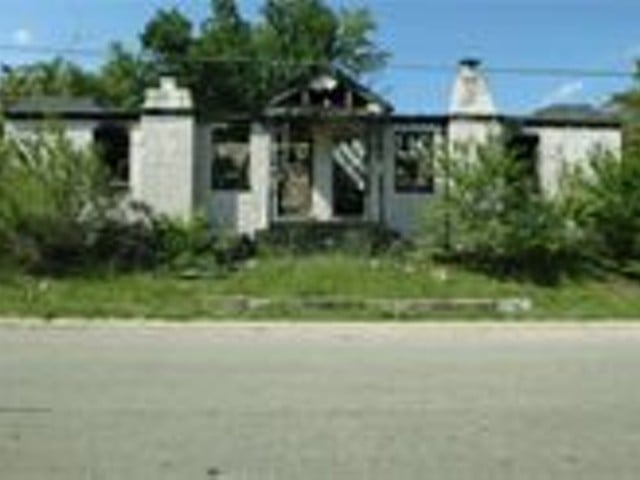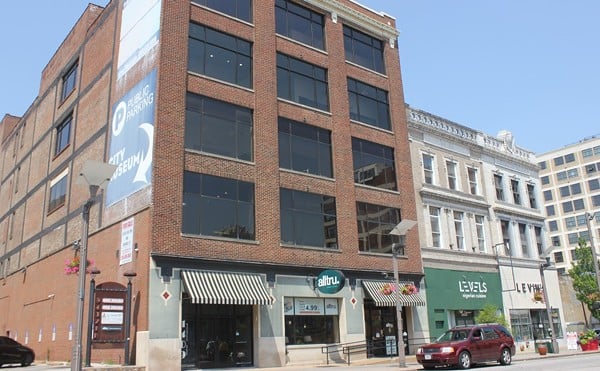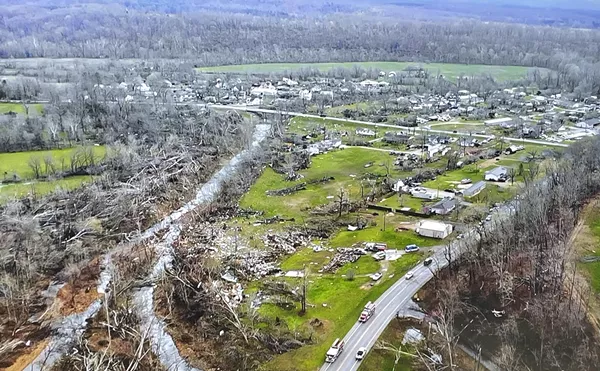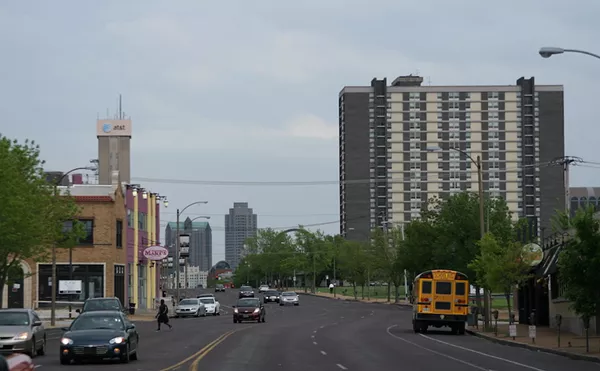Fate came crashing down on William Peppes the afternoon of February 4, 1995, when a single-engine plane nosedived into the Bernard Pub, his boarded-up bar in McRee Town.
None of the Tanzanian student-pilots aboard the plane — or anyone on the ground — were badly injured in the accident. But for Peppes, the incident begat yet another round of headaches surrounding his cherished plot. Today the crash site remains empty, save for a few weeds, tree stumps and a white, wooden cross that Peppes placed in the ground last fall. The cross carries the warning "No Trespassing."
On a June afternoon, Peppes points out the most recent damages to his property. Last summer, he says, a construction worker from the nearby Botanical Heights subdivision — an eminent-domain redevelopment rising up all around Peppes' vacant quarter-acre lot — dumped a load of gravel on his property and chewed up the soil.
Tire tracks from the dumping, Peppes points out, still remain. The most brazen crime of all came last October: A bulldozer entered his plot and knocked over five of Peppes' beloved locust trees, which he planted in 1973. "It brought tears to my eyes," recalls the 58-year-old Peppes. "I nurtured those trees for more than 30 years. They were marked 'Private Property.' But it didn't matter. Just like that, they were gone."
A compact man with shoulder-length salt-and-pepper hair, Peppes keeps his pinky nails long and manicured — a style, he says, that is common among Greek men. He favors plaid Bermuda shorts and sneakers with no socks. For the past several months he's taken to wearing the same T-shirt nearly every day as a tribute to the fallen trees. The beige Greenpeace garment depicts a tree stump next to a fully grown tree. The shirt's tagline reads: "Size Does Matter."
Peppes may be something of an eccentric, but he's the only property owner to fight the McRee Town eminent-domain project spearheaded by the Missouri Botanical Garden — and win.
"The guy is like Job," says Peppes' St. Louis attorney, James Dowd. "First a plane destroys his building. Then developers try to take his property. Then they cut down his trees. Still, he stands and fights. He's a great human being."
To hear Peppes tell it, his devotion to the property has more to do with family heritage than stubbornness. He was just five years old in 1952 when his parents purchased the stately brick building on the corner of Thurman and Lafayette avenues in McRee Town.
At the time, the property featured a confectionery, a beauty parlor, a cleaner and four upstairs apartments. Peppes recalls the community as vibrant and close-knit — a far cry from what became of the neighborhood following the completion of nearby Interstate 44 in the mid-1960s.
The highway cut off McRee Town from the more affluent neighborhoods surrounding the Missouri Botanical Garden to the south. Property values plummeted. Homeowners sold out or abandoned buildings all together. Squatters and crime moved in.
In 1973 a fire swept through the Peppes' building, destroying much of the turn-of-the-century structure. Peppes — then just 26 — rehabbed the building with plans of turning it into a bar and restaurant. Little did he know that, 117 years earlier, Missouri Botanical Garden founder Henry Shaw struck a covenant with the city prohibiting "dram shops" and other "nuisance businesses" from selling alcohol in a 130-block region surrounding the garden.
The issue was eventually sorted out when former St. Louis Mayor John Poelker and other city officials came to Peppes' aid to lift the ban. For much of its fifteen years in McRee Town, Peppes says, his saloon was one of the few businesses operating in the neighborhood.
But the vibrancy of the pub proved no match for the violence and decay of the surrounding area. In 1990, Peppes says, he "mothballed" the building with the intent of reopening business just as soon as the neighborhood rebounded. For a short while he allowed a destitute neighborhood woman to stay in the boarded-up building free of charge. One day he found her murdered inside the bar. Five years after his grisly discovery, Peppes was jolted again with news of the plane crash. "It was dreadful," he says. "I'd put my heart and soul into that building. I was devastated."
Peppes later won a $96,000 judgment for property damage resulting from the accident. But he maintains the money was hardly enough to pay for the razing and removal of the building and didn't compensate him for the structure's true worth.
In July 2004 Peppes received a letter from the McRee Town Redevelopment Corporation, offering to purchase his property for $8,500 as part of its eminent-domain project that would replace 300 derelict city dwellings with new, single-family homes priced between $130,000 and $350,000. The offer, says Peppes, was a slap in the face.
"I've been maintaining this property all this time with the intent of rebuilding," he says. "My family has owned this land for 54 years. It's not for sale."
In November 2004 the McRee Town Redevelopment Corporation sued Peppes for right-of-condemnation, which would allow the agency to acquire the land. During the seventeen months that the suit languished in St. Louis City Circuit Court, Peppes filed a preliminary and supplemental plan with the redevelopment corporation, requesting that he design and build a new structure on his property. According to Peppes, the plans were flatly rejected.
Peppes' attorneys, James Dowd and Charlene Kass, argue that the rejections were "arbitrary and capricious" and that the redevelopment corporation acted in "gross disregard" to the city ordinance that established the wholesale blighting of McRee Town. That ordinance, approved by the Board of Aldermen in 2002, allows for private property owners to develop their own property within the design guidelines of the redevelopment corporation.
"The developer either didn't understand the law or didn't want to comply with it," maintains Dowd.
On June 5 the McRee Town Redevelopment Corporation dismissed its eminent-domain claim against Peppes. Tom Pickle, executive director of the Garden District Commission — the nonprofit agency that oversees the McRee Town Redevelopment Corporation — confirms that of the 300 properties within the site plan of Botanical Heights, Peppes is the lone holdout.
As for the allegations that the redevelopment corporation acted in "gross disregard" when rejecting Peppes plans for the property, Pickle says he can't comment. Those decisions were made by his predecessor, George Robnett Jr., who left the organization last year.
Outraged by the bulldozing of his prized locust trees last fall, Peppes filed a lawsuit against McRee Town Redevelopment Corporation and others associated with the Botanical Heights development. The initial suit, filed earlier this year, asked for $25,000 in property damage as a result of the destruction of the trees.
Buoyed by his legal victory over the development corporation last month, Peppes added another claim to the suit, seeking $15,000 for legal fees he incurred fighting the condemnation. "I've been beaten and bludgeoned by them," says Peppes. "Now, I'm seeking vindication."
Meanwhile, Peppes is redesigning plans to develop on the old family plot. In addition to a new, single-family home, Peppes would like to make a section of the property a public green space. Like any good Greek son, he plans to name the park after his dearly departed mother. Her name? Victoria.





